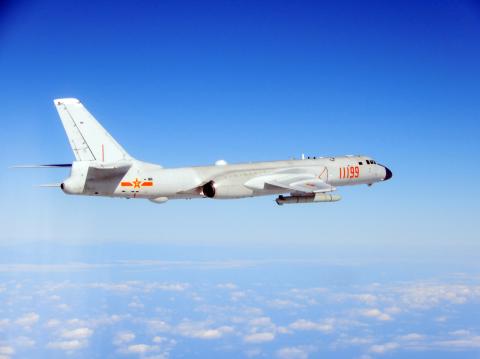Chinese People’s Liberation Army Air Force aircraft yesterday passed through the narrow Bashi Channel to the south of Taiwan on a long-range exercise, Taiwan’s Ministry of National Defense (MND) said, the first publicized drills near the nation since elections earlier this month.
China has routinely sent bombers and other aircraft close to Taiwan since President Tsai Ing-wen (蔡英文) took office in 2016.
Beijing believes that Tsai is pushing for Taiwan’s formal independence.

Photo: CNA
In an interview with the BBC earlier this month, Tsai said Taiwan is already an independent nation called the Republic of China.
She won re-election by a landslide on Jan. 11 on a platform of standing up to China.
In a short statement, the MND said that the Chinese airplanes, including H-6 bombers and KJ-500 early warning and control aircraft, flew to the south of Taiwan through the Bashi Channel, which separates the nation from the Philippines.
After carrying out drills above the Pacific Ocean, the aircraft returned to China, the ministry said.
The armed forces have a well-honed system to monitor and respond to such drills, it added, without giving details or saying whether fighter jets were scrambled.
The Chinese Ministry of National Defense did not immediately respond to a request for comment.
Following Tsai’s re-election, Chinese state media suggested that China could flex its muscles near Taiwan to register Beijing’s continued displeasure with Tsai.
The seas around Taiwan are a closely watched zone not only for Taipei, but also Beijing.
A US warship last week sailed through the Taiwan Strait, with the US Navy conducting sporadic transits of the waterway since 2018.
China sailed its newest aircraft carrier, the Shandong, through the Taiwan Strait twice in the run-up to the Jan. 11 presidential and legislative elections.
Taipei denounced that as attempted intimidation.

NATIONAL SECURITY THREAT: An official said that Guan Guan’s comments had gone beyond the threshold of free speech, as she advocated for the destruction of the ROC China-born media influencer Guan Guan’s (關關) residency permit has been revoked for repeatedly posting pro-China content that threatens national security, the National Immigration Agency said yesterday. Guan Guan has said many controversial things in her videos posted to Douyin (抖音), including “the red flag will soon be painted all over Taiwan” and “Taiwan is an inseparable part of China,” while expressing hope for expedited “reunification.” The agency received multiple reports alleging that Guan Guan had advocated for armed reunification last year. After investigating, the agency last month issued a notice requiring her to appear and account for her actions. Guan Guan appeared as required,

Japan and the Philippines yesterday signed a defense pact that would allow the tax-free provision of ammunition, fuel, food and other necessities when their forces stage joint training to boost deterrence against China’s growing aggression in the region and to bolster their preparation for natural disasters. Japan has faced increasing political, trade and security tensions with China, which was angered by Japanese Prime Minister Sanae Takaichi’s remark that a Chinese attack on Taiwan would be a survival-threatening situation for Japan, triggering a military response. Japan and the Philippines have also had separate territorial conflicts with Beijing in the East and South China

A strong cold air mass is expected to arrive tonight, bringing a change in weather and a drop in temperature, the Central Weather Administration (CWA) said. The coldest time would be early on Thursday morning, with temperatures in some areas dipping as low as 8°C, it said. Daytime highs yesterday were 22°C to 24°C in northern and eastern Taiwan, and about 25°C to 28°C in the central and southern regions, it said. However, nighttime lows would dip to about 15°C to 16°C in central and northern Taiwan as well as the northeast, and 17°C to 19°C elsewhere, it said. Tropical Storm Nokaen, currently

PAPERS, PLEASE: The gang exploited the high value of the passports, selling them at inflated prices to Chinese buyers, who would treat them as ‘invisibility cloaks’ The Yilan District Court has handed four members of a syndicate prison terms ranging from one year and two months to two years and two months for their involvement in a scheme to purchase Taiwanese passports and resell them abroad at a massive markup. A Chinese human smuggling syndicate purchased Taiwanese passports through local criminal networks, exploiting the passports’ visa-free travel privileges to turn a profit of more than 20 times the original price, the court said. Such criminal organizations enable people to impersonate Taiwanese when entering and exiting Taiwan and other countries, undermining social order and the credibility of the nation’s